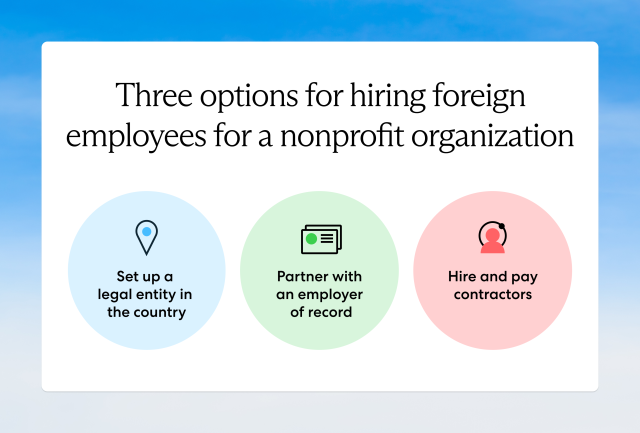Nonprofit organizations strive to create positive change in the world. While each entity has a different mission, expansion is often a shared goal. Many expand globally to spread their message and extend their impact to as many people as possible.
As nonprofits enter new markets and hire foreign employees, they must navigate complex labor and tax codes to ensure compliance and minimize costs. For instance, hiring talent overseas may trigger a local tax liability.
This guide explains how to compliantly hire employees for a nonprofit organization abroad. Discover three options for engaging international talent, learn key compliance risks, and find answers to common questions about navigating foreign labor codes and running payroll for a global team.
How does a nonprofit hire an employee?
The fundamental hiring process for nonprofits is similar to that of for-profit businesses—they follow standard recruiting, hiring, and onboarding practices according to local regulations. However, nonprofits have unique missions, funding sources, regulatory requirements, and stakeholder expectations that shape their recruitment and employee management approach.
Nonprofits are mission-driven organizations that serve the public good and advance specific causes. As a result, they focus as much on sourcing talent with skills, experience, and qualifications that can contribute to growth as they do values and passions that align with their mission.
Because they often rely on donations, grants, and other fundraising methods, nonprofits may have limited hiring resources and must prioritize cost-effectiveness. Conversely, for-profit businesses usually have more resources to invest in competitive salaries, benefits, and recruitment efforts and primarily focus on hiring talent that can raise the bottom line.
How does a nonprofit hire a foreign employee?
Nonprofit organizations can hire foreign employees in one of three ways: establishing a legal business entity in their target market, partnering with an employer of record (EOR), or hiring international contractors.
The best option for any organization depends on its individual goals and circumstances. Below, we outline each approach in detail and discuss its advantages and disadvantages.

Set up a legal entity in the foreign country
In most countries, foreign organizations must establish a local business entity to legally hire local talent. This rule also applies to nonprofits.
With a legal business entity, you can create a foreign branch or subsidiary and manage the entire employment process internally, from hiring and onboarding to running payroll and administering benefits. This approach allows you to reduce long-term hiring costs and minimize risk exposure.
Still, the high cost of entity establishment is a significant barrier for companies operating on a limited budget. Initial setup costs usually range from US$15,000 to US$20,000, depending on the country. Plus, annual maintenance fees can reach up to US$200,000.
You also need to spend time and resources training legal, HR, finance, and operations teams to manage their tasks in a new regulatory environment with different customs and languages. There is also less flexibility should you need to exit the market quickly.
Entity establishment only makes sense if your organization wants to establish a long-term, staffed operation in your target market. For a more flexible, affordable approach to building a global team, consider partnering with an EOR.
Partner with an employer of record (EOR)
Working with an EOR requires less money, time, and commitment than entity establishment while offering many of the same benefits.
An EOR is a third-party entity with global infrastructure and international legal expertise that allows nonprofit organizations to hire employees overseas without establishing local entities or worrying about noncompliance.
By serving as the legal employer of your global workforce, an EOR makes it easy to quickly and compliantly hire foreign talent while remaining agile as you expand. By partnering with an EOR, you can be up and running in your target market within weeks rather than months and easily pivot or scale operations as you grow.
An EOR partner also handles hiring, onboarding, immigration, compliance, and other employment responsibilities such as running global payroll, administering global benefits, and offering ongoing support to your international workforce in their native language.
By handling complex labor, tax, and regulatory issues, an EOR partner simplifies expansion, giving you the time and energy to focus on your team’s day-to-day tasks as you enter new markets.
Learn more: What Is an Employer of Record (EOR)?
Engage contractors
A third option for hiring international talent is to engage remote contractors from abroad. Some nonprofits prefer this approach for its cost savings and added flexibility.
By engaging international contractors, you can source highly skilled talent for one-off projects while saving the time and resources you would otherwise invest in hiring, onboarding, and paying a team of full-time employees.
However, organizations that choose this route must practice extra due diligence when classifying talent. Worker classification laws are often complex and vary drastically worldwide, posing a serious risk for foreign employers unfamiliar with local laws.
While some organizations misclassify contractors to avoid payroll and onboarding expenses, many find themselves noncompliant by accident and face heavy fines and litigation. We discuss this topic in greater detail later on.
Read also: Should You Hire a Contractor or an Employee?
Global compliance risks when hiring employees for a nonprofit organization
Navigating labor and tax codes in a foreign country can be overwhelming, especially for organizations that already follow strict guidelines to maintain their nonprofit status. Still, avoiding the risks, fines, and penalties that result from noncompliance is key to staying on budget as you expand.
As you build a global workforce, familiarize yourself with major compliance risks in each market, such as local tax requirements, employment codes, worker classification laws, and permanent establishment regulations.
We discuss each of these in detail below and provide tips on mitigating risk.
Global tax requirements
Nonprofits must familiarize themselves with tax requirements in each of their target markets to ensure they fulfill their local tax obligations and avoid fines, back taxes, and limited business opportunities.
Since your nonprofit status at home may not apply abroad, you may have to reestablish your status overseas and apply for exemptions. While nonprofits usually aren’t subject to the same taxes as for-profit businesses, regulations vary worldwide, and you may be liable to pay circumstantial taxes in some jurisdictions.
For instance, all nonprofits in the U.S. are eligible for certain tax benefits, including sales, property, and income tax exemptions. However, their status does not automatically exempt them from federal income tax. They must apply for federal income tax exemption directly with the Internal Revenue Service (IRS).
Nonprofits must also comply with local payroll tax regulations. This includes deducting income taxes, statutory withholdings, and applicable levies and cesses from their employee’s earnings.
Due to the complexity of navigating federal, state, and local tax codes and applying for exemptions in multiple jurisdictions, many nonprofits partner with a global expansion expert, such as an EOR, to handle compliance on their behalf.
Varying employment laws and regulations
Federal, state, and local employment laws guarantee employees various rights, such as minimum wage protections, paid leave entitlements, termination requirements, severance pay, and annual bonuses.
However, employment laws vary drastically worldwide. For instance, most countries require notice periods, severance payments, and paid annual leave. However, federal regulations in the U.S. don’t govern any of these rights.
Like tax codes, navigating global employment regulations is a complex and overwhelming task for HR teams. Many global nonprofits seek third-party legal expertise from an in-country entity to mitigate this risk.
Misclassification
As previously mentioned, misclassification occurs when an employer classifies a worker as a contractor while establishing an employment relationship with them. Penalties for misclassification usually include hefty fines, reputational damage, and time-consuming litigation.
While contractors don’t receive the same protections and rights as employees, they enjoy more independence. Local regulations in most countries ensure contractors can establish their own work schedule, choose their own work attire, collaborate with multiple clients at once, and subcontract projects to other contractors as needed.
However, regulations vary drastically worldwide. Each country establishes unique classification criteria while also considering the general context of the working relationship to settle disputes.
Imagine a Canadian IT company hires several Dutch contractors for a one-off, short-term project. The IT company doesn’t influence the contractors’ work schedule, control where they source their materials, or determine who they hire as assistants—the contractors maintain an independent working relationship with the company.
As the contractors become more involved with the IT company, they take on additional work, eventually earning the majority of their income from their Canadian client. This often establishes an employer-employee relationship under Dutch regulations and puts the IT company at risk of fines and costly litigation.
Correctly classifying talent at the start of your working relationship, regularly auditing relationship dynamics, and staying abreast of regulatory changes over time are critical steps for ensuring ongoing compliance.
Read more in our complete guide to employee misclassification.
Permanent establishment
Any time an organization hires talent abroad, it risks creating a permanent establishment (PE) and subjecting itself to local corporate taxation. This applies to nonprofit and for-profit entities alike.
Typically, if an organization operates from a fixed location in a foreign country, it qualifies as a PE and must pay local corporate taxes. The term “fixed location” usually refers to physical premises, such as workshops, office buildings, storage facilities, or resource extraction sites.
However, in many countries, a fixed location also includes local agents who regularly close business contracts on behalf of a foreign entity. In other words, engaging international contractors can also trigger a local corporate tax responsibility.
If you qualify as a PE, clarify your local tax liabilities as a nonprofit organization. Remember, your nonprofit status at home may not apply in your target market. You may need to reestablish this status and apply for tax exemptions.
Ensuring compliance with local PE codes and identifying exemptions is critical for reducing costs, avoiding delays, and ensuring long-term success as you expand your global footprint.
FAQ about hiring employees for a nonprofit organization
Below, you can find answers to common questions about hiring employees for a nonprofit organization.
How does a nonprofit pay employees?
Nonprofit organizations pay employees the same way for-profit companies do. They incorporate employees into the company payroll, make accurate withholdings and deductions with each pay cycle, and deliver timely payments to their team from a company bank account, usually via check or direct deposit. Payroll tax rates, withholdings, and required payment methods vary worldwide.
Do federal laws apply to nonprofit staff?
In most countries, nonprofit organizations must comply with the same labor and employment laws as for-profit entities. However, select federal laws in some countries don’t apply to nonprofits, depending on the nature of their business, annual revenue, or number of employees.
For instance, the Federal Labor Standards Act (FLSA) in the U.S. sets minimum wage, overtime, recordkeeping, and child labor standards. However, this law doesn’t cover nonprofit charitable organizations unless they engage in commercial activity outside their primary charitable work that generates annual revenue of more than US$500,000.
Compliantly hire employees for a nonprofit organization with Velocity Global
Hiring foreign employees for a nonprofit organization can be challenging. Still, changing lives abroad is a reward that far outweighs the risks. Partner with an experienced global expansion expert to maximize your chances of success in the international marketplace.
Velocity Global’s EOR solution helps nonprofits navigate the unique challenges of international expansion. We make it easy to quickly and compliantly hire talent in over 185 countries without undergoing entity establishment or worrying about violating local labor and tax codes.
Our global HR experts and suite of workforce management solutions simplify and streamline every aspect of international employment. This includes hiring, onboarding, immigration, compliance, running global payroll, administering global benefits, and providing ongoing HR support to your team, no matter their location.
With Velocity Global at your side, you can focus on making a positive, international impact with confidence and peace of mind. Contact us today to learn how we can help you expand globally without the added burden.
Topic:
Country Guides



